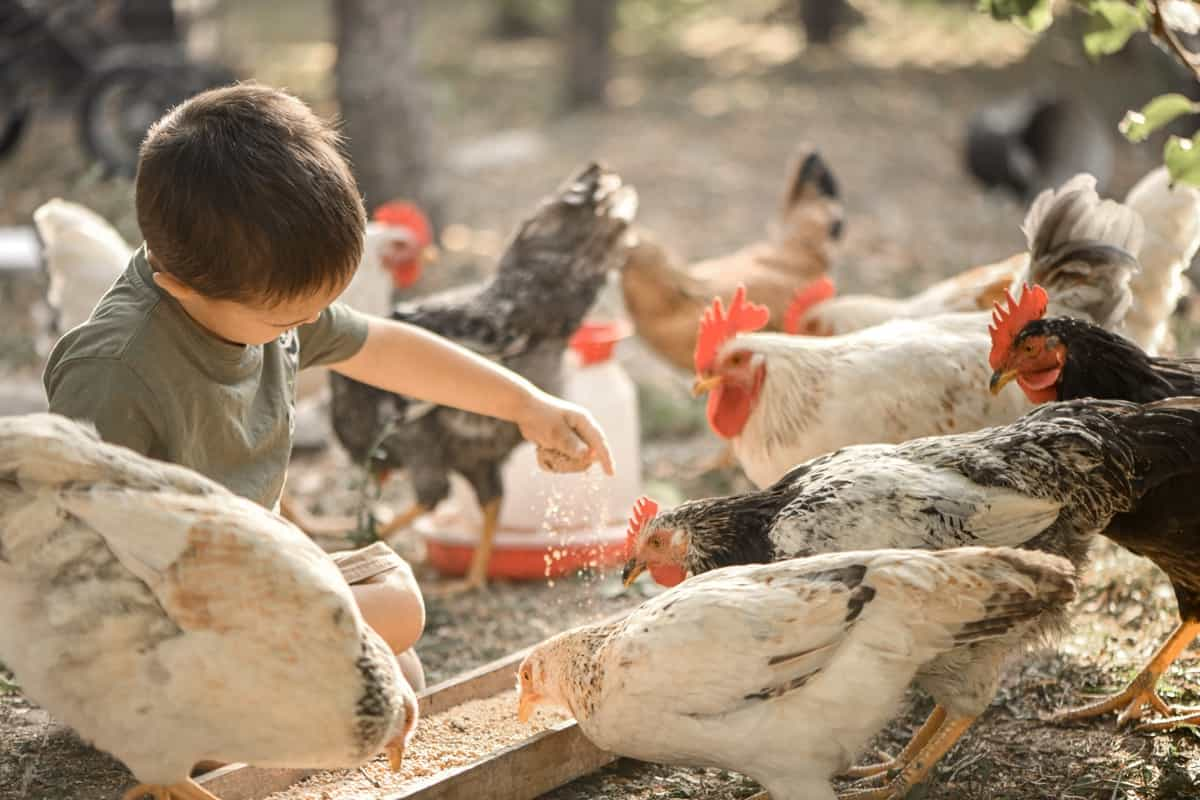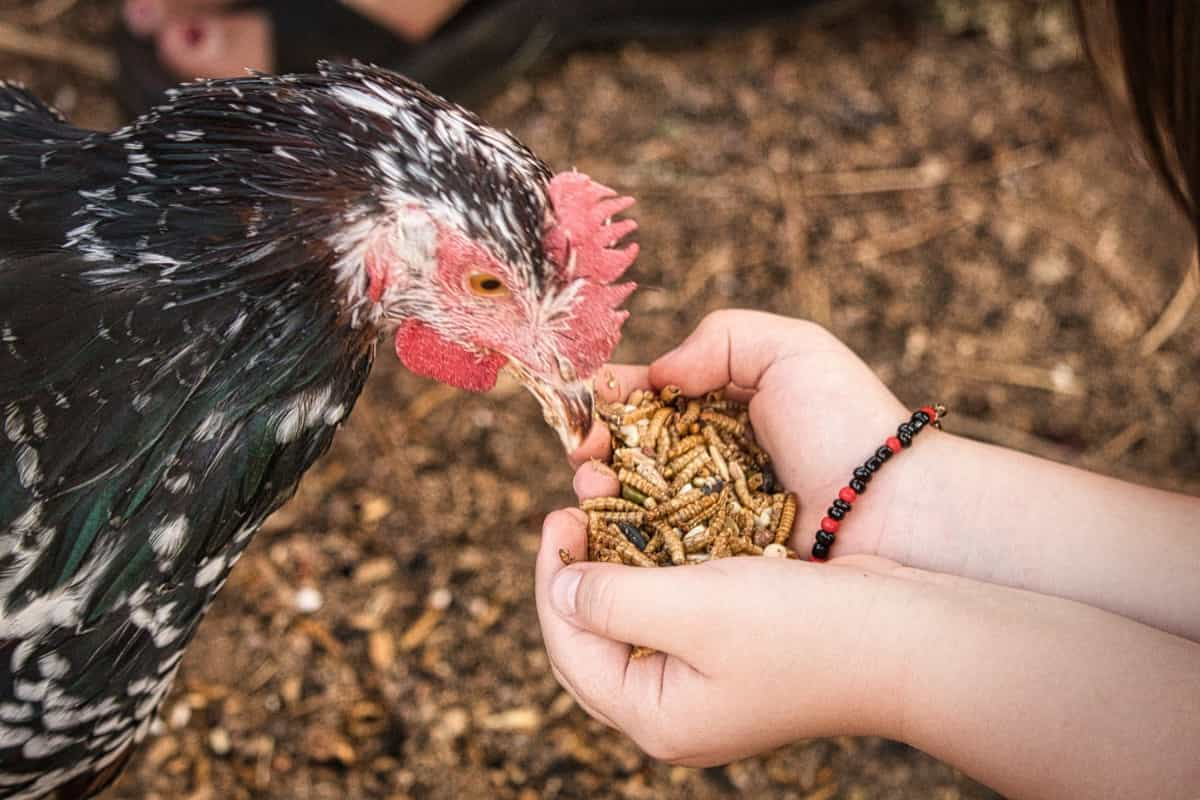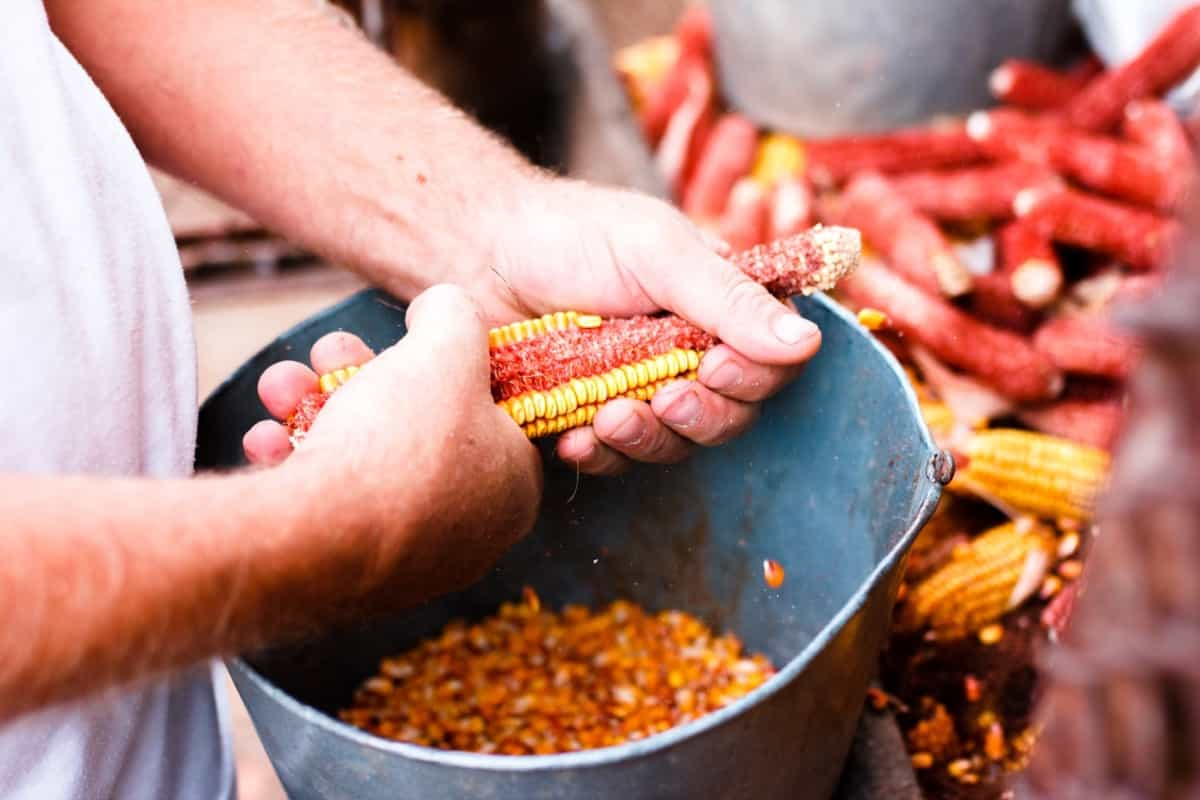Raising chickens can be rewarding, providing fresh eggs and contributing to a sustainable lifestyle. Creating homemade chicken feed gives you complete control over what goes into your birds’ diet. This means you can select only high-quality, nutritious ingredients and avoid harmful additives or fillers often found in commercial feeds.

How to Make Your Own Chicken Feed at Home
Homemade Organic Chicken Feed Recipes
- Organic chicken feed can be a great way to ensure your birds get the nutrients they need healthily and affordably.
- One recipe includes mixing corn, wheat bran, alfalfa meal, oats, and peas for a balanced blend of grains. Flaxseed or fishmeal will provide additional protein and omega-3 fatty acids for improved health.
- Another recipe uses sprouted grains like barley or wheat as the base, with added soybean meal and sunflower seeds for protein. Adding kelp powder provides essential vitamins and minerals like iodine.
- Homemade organic chicken feed is an excellent option for those looking to control their flock’s diet while avoiding harmful chemicals often used in commercial feeds.
Step-by-step Guide to Making Chicken Feed at Home
- Firstly, gather all the ingredients needed to make this homemade chicken feed. You will need 30% corn, 30% wheat, 20% peas, 10% oats, and 10% fish meal. These can be found at your local feed store or online.
- Once you have all the ingredients on hand, it’s time to start mixing! Begin by combining the corn and wheat in a large container. Mix them thoroughly before adding in the peas and oats.
- Next up is the fish meal – an excellent source of protein for your chickens. Add it to the mixture slowly until everything is evenly distributed.
- Now it’s time to add extra nutrients for your birds’ health. Mix in 2% of poultry Nutri-balancer and free choice kelp and aragonite. These supplements provide essential vitamins and minerals for strong eggshells and chicken health.
- Give everything a good stir until all ingredients are nicely blended. Transfer it into a container with a tight-fitting lid to keep it fresh for as long as possible.
- After everything is well mixed, storing it properly in air-tight containers away from moisture or pests like mice or insects is important.
Nutritional Ingredients for DIY Chicken Feed
- Grains are an essential component of any chicken feed recipe. These can include wheat, barley, corn, or even oats. Grains provide carbohydrates that supply energy to your feathered friends throughout the day.
- Next up are protein sources such as soybean meal or fishmeal. These help maintain muscle mass and promote growth in chickens, from young chickens to full-grown hens.
- In addition to grains and proteins, it’s important to incorporate vitamins into your homemade chicken feed mix. This includes vitamin A for better vision and healthy skin, vitamin D for stronger bones, and vitamin E for improved immunity against diseases.
- Minerals should also be added, such as calcium which promotes strong eggshells; phosphorus which supports bone development; magnesium which helps regulate body temperature, among others.
Best Grains for Homemade Chicken Feed
- Corn is a popular grain choice for many poultry farmers due to its high energy content. It’s also relatively inexpensive and widely available.
- Wheat is another great option for homemade chicken feed as it contains protein and fiber, which supports digestive health.
- Oats are affordable and rich in nutrients like phosphorus, calcium, and iron – all necessary components contributing to healthy bones, strong immune systems, and overall poultry health.
- Barley may be less commonly known than other grains on this list but has significant benefits, such as promoting gut health by reducing inflammation caused by harmful bacteria while enhancing beneficial microorganisms essential for proper digestion.
- Incorporating these grains into your homemade chicken feed will give your flock the high-quality nutrition needed for optimal growth and productivity.
In case you missed it: What and How to Feed Your Chickens: A Comprehensive Guide

Balanced Protein Sources for Chicken Feed Formulation
- Balancing the protein sources is crucial for your poultry’s growth and overall health. While grains like corn and wheat serve as good energy sources, they lack essential amino acids for muscle development in chickens.
- Incorporating high-protein ingredients like soybean meal, sunflower seeds, and fishmeal into your chicken feed can help balance the grain-based diet. Soybean meal contains a well-balanced profile of amino acids that can promote healthy feathering and egg production in hens.
- Other great protein sources include dried insects such as black soldier fly larvae or mealworms. They provide a sustainable protein source and contain important vitamins and minerals needed for optimal chicken health.
Supplements for Homemade Poultry Feed
- Supplements play an essential role in balancing your homemade poultry feed. They provide additional nutrients that cannot be obtained from grains alone. Some of the best supplements for homemade chicken feed are oyster shells, grits, and probiotics.
- Oyster shells are a great calcium source that helps strengthen eggshells and prevent soft-shelled eggs.
- Other supplements you can add to your homemade poultry feed include kelp powder which is rich in minerals such as iodine and iron, a fish meal that provides protein and omega-3 fatty acids; dried herbs for added flavor; garlic powder which acts as a natural antibiotic; and diatomaceous earth which helps control parasites.
- When adding supplements to your homemade chicken feed recipe, ensure you do it gradually to avoid over-supplementing or imbalances. Always consult a veterinarian or nutritionist before introducing new feeds into your flock’s diet.
Tips for Optimizing Homemade Chicken Feed for Egg Production
- Ensure that chickens have access to clean water at all times. Dehydration can lead to poor egg production and even death. Include calcium-rich ingredients such as crushed oyster shells or ground limestone in their feed. Calcium plays an essential role in forming strong eggshells.
- Provide your chickens with adequate protein sources like soybean meal or fishmeal, as they require high-quality protein for optimal growth and egg-laying capacity.
- Avoid feeding them too many treats like scratch grains as they are low in nutrients but high in calories leading to obesity and decreased productivity.
Non-GMO Chicken Feed Recipes
- Non-GMO chicken feed recipes can include a variety of grains such as corn, wheat, and oats. These can be mixed with natural ingredients like dried fruits and vegetables to provide essential vitamins and minerals.
- One popular recipe includes mixing whole grains like barley, millet, flaxseed, sunflower, and pumpkin seeds for added nutrition. This mix can then be combined with soy-free layer pellets to create a well-rounded diet for your flock.
- Another great option is combining rolled oats and quinoa flakes with ground nuts like almonds or cashews. Add in some dried mealworms or crickets for an additional protein boost.
- Many non-GMO chicken feed options are available online or at local organic farms.
Cost-effective Ingredients for Making Your Chicken Feed
- Consider using grains as the base ingredient in your homemade chicken feed. Grains like corn and wheat are affordable and widely available at most feed stores.
- In addition to grains, look for inexpensive protein sources and other essential nutrients.
- Another cost-effective option is to use kitchen scraps and garden waste whenever possible. Chickens will happily eat carrot tops, cucumber peels, and small amounts of cooked rice or pasta.
- Don’t forget about supplements like oyster shells or grit. While they may seem pricey upfront, these products can help ensure your chickens stay healthy over time.
Benefits of Homemade Chicken Feed for Poultry Health
- Homemade chicken feed offers several benefits to the overall health of poultry. Making your chicken feed allows you to control the quality and source of ingredients used in the formulation. This ensures your chickens consume a balanced diet free from harmful chemicals, preservatives, or genetically modified organisms.
- Moreover, feeding organic non-GMO ingredients has been shown to increase the nutritional value of eggs produced by hens fed such diets resulting in healthier eggs with higher omega-3 fatty acid content.
- Homemade chicken feed minimizes exposure to antibiotics or other unnecessary additives in commercial feeds. This leads to lower antibiotic resistance among poultry and safer consumption for humans who consume their products.
- Homemade chicken feed promotes better health outcomes for poultry while minimizing environmental risks associated with industrially-produced livestock mixtures.
In case you missed it: Sapphire Gem Chicken: Breed Origin, Temperament, Facts, Raising, and Care

Conclusion
Preparing your chicken feed offers numerous benefits, including better nutrition control, cost savings, customized diets according to specific needs, and promoting eco-friendly practices, all essential aspects of responsible poultry keeping. Making your chicken feed will save you money and help keep your birds healthy while providing them nutritious meals.
- Feed Your Flock for Less: Top 10 Tips to Save on Chicken Feed
- Ultimate Guide to Ossabaw Island Hog: Breeding, Raising, Diet, and Care
- Hatching Answers: The Top 10 Reasons Your Chickens Aren’t Laying Eggs
- Eggs and Economics: Breaking Down the Cost of Raising Backyard Chickens
- Defend Your Greens: Proven Methods to Keep Iguanas Out of Your Garden
- Ultimate Guide to Cinnamon Queen Chicken: A Comprehensive Guide for Beginners
- Ultimate Guide to California Tan Chicken: Breeding, Raising, Diet, Egg-Production and Care
- Ultimate Guide to Marsh Daisy Chicken: Breeding, Raising, Diet, and Care
- 10 Types of Chicken Farming Businesses You Can Start for Profits